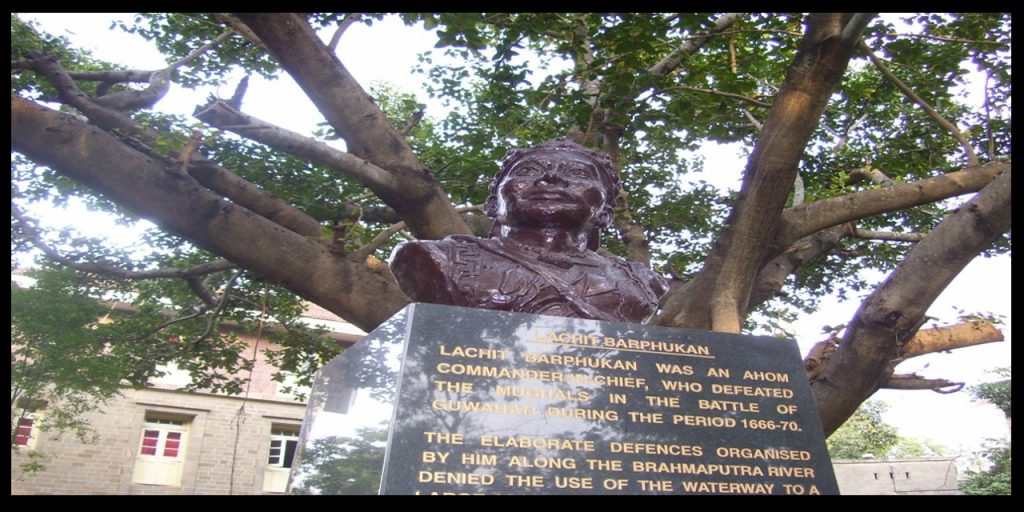The valiant warrior who repelled the huge army of Mughal and forced them to accept defeat. This brave warrior is none other than Lachit Borphukan who protected the interest of the state. He sacrificed his life for the country without thinking twice. He made the nation proud by defending its boundaries from invader Mughals.
Lachit was born in 1620 AD to Momai Tamuli Barbaru who was a senior officer in the administration. Lachit’s intense interest was in administration since childhood. Due to his hard work and dedication, he was appointed as a royal shawl bearer which was considered a senior position in the ministry. With time he was entrusted other senior posts like head of the royal stables, king head bodyguard, etc. But, Lachit had a lot of challenges after becoming Borpukan.
On one hand, the Mughal army was said to be one of the largest armies in the world with experienced generals like Shaiste Khan and Diler Khan, on the other hand, a dejected and divided Ahom army. So, he focused on organizing the army and weapons for the next 4 years. He started recruiting new soldiers, building boats for the navy, upgrading weapons, acquiring cannons, strengthening forts, etc. And, this all was going on without letting Mughals know about these preparations as they maintained friendly relationships with Mughals during these times.
In 1667 AD the head of Guwahati fort was changed from Rashid Khan to Firoz Khan who was cruel as he committed atrocities such as raping Assamese girls and looting the locals. This incident angered the Ahoms and forced them to fight against the Mughals. Lachit decided to recapture Guwahati from the Mughals. He had a good navy and a network of spies but lacked a cavalry. Even after months of siege Guwahati protected by Itakuli fort could not be liberated. Then they used plan B, where a few soldiers under Ismail Siddiqui (Bagh Hazarika) entered the fort at night and put water in the Mughal cannons. The next morning Lachit’s army attacked Itakuli and won it.

When Aurangzeb
Once he caught his own uncle sleeping during guard and immediately beheaded him. His rationale was that uncle is not greater than national security. This won Lachit a lot of admiration from his soldiers. They were convinced that beating back Mughals was not impossible till Ahom pursuded guerilla warfare they were able to subdue Ram Singh so he made another malicious plan. He was successfully able to bribe some Ahom officers to switch sides then he tried to force Ahoms into open warfare.
Lachit knew that Ahoms did not have a chance to win in open warfare as they lacked cavalry for attack. But the king got impatient and ordered a frontal attack. In the field battle of Alaboi in 1669, the Ahom army lost badly. Lachit lost ten thousand soldiers but fortunately, he survived and so did the kingdom. In 1670 Raja Chakradhwaj Singha died and Udayaditya Singha became the new king. In 1671 Ram Singh was informed about some breacheds in Ahom defence and decided to launch a final attack. He set up a large Mughal navy in preparation. There were 40 ships full of cannons and other arms. Unfortunately, Lachit was so ill at this time that he was bedridden.
The battle of Saraighat started in March 1671. This was a unique battle fought exclusively on a river the mighty Brahmaputra river. At first, the Ahoms were beaten back. When Lachit got to know about this he defied the advice of his doctor and astrologer and decided to fight. He said,
The Ahom army used many innovative techniques like water forts from where they could attack the enemy. Thought their boats were smaller but faster and more dangerous than Mughal ships. As a result, the Mughal admiral Munawar Khan was killed by a stray bullet. By the end of the day, Mughals had lost 3 chiefs and 4,000 soldiers.
The victory at Saraighat resulted in many positive socio-cultural developments by future kings like Rudra Singha. Sadly soon after the Saraighat victory, Lachit died of illness. There was a final battle in 1682 AD when Mughals were defeated once and for all.
Unfortunately, not many people outside Assam know about these heroic exploits. Proudly 24th November is celebrated as Lachit day every year. May the glory of heroes like Lachit remain evergreen.












